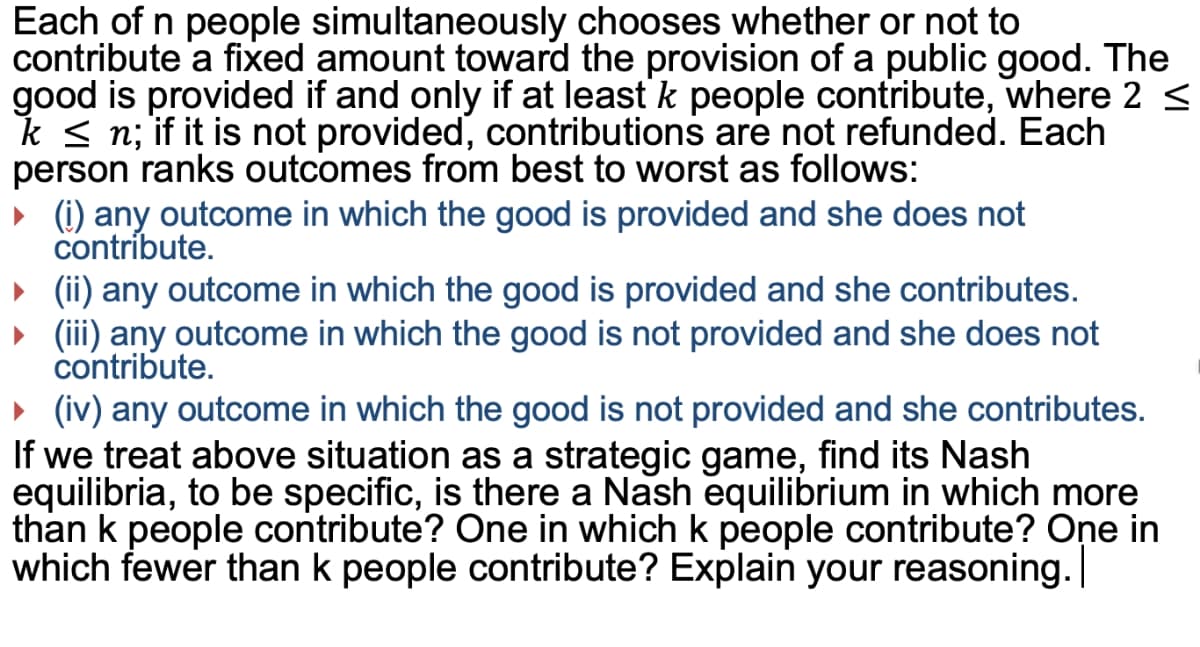Each of n people simultaneously chooses whether or not to contribute a fixed amount toward the provision of a public good. The good is provided if and only if at least k people contribute, where 2 < k < n; if it is not provided, contributions are not refunded. Each person ranks outcomes from best to worst as follows: » (i) any outcome in which the good is provided and she does not contríbute. » (ii) any outcome in which the good is provided and she contributes. ► (ii) any outcome in which the good is not provided and she does not contribute. » (iv) any outcome in which the good is not provided and she contributes. If wo troat above situuation cas stratogic ganme fincd its No sh
Each of n people simultaneously chooses whether or not to contribute a fixed amount toward the provision of a public good. The good is provided if and only if at least k people contribute, where 2 < k < n; if it is not provided, contributions are not refunded. Each person ranks outcomes from best to worst as follows: » (i) any outcome in which the good is provided and she does not contríbute. » (ii) any outcome in which the good is provided and she contributes. ► (ii) any outcome in which the good is not provided and she does not contribute. » (iv) any outcome in which the good is not provided and she contributes. If wo troat above situuation cas stratogic ganme fincd its No sh
Chapter17: Market Failure: Externalities, Public Goods, And Asymmetric Information
Section: Chapter Questions
Problem 12QP
Related questions
Question
100%

Transcribed Image Text:Each of n people simultaneously chooses whether or not to
contribute 'a fixed amount toward the provision of a public good. The
good is provided if and only if at least k people contribute, where 2 <
k < n; if it is not provided, contributions are not refunded. Each
person ranks outcomes from best to worst as follows:
» (i) any outcome in which the good is provided and she does not
contribute.
(ii) any outcome in which the good is provided and she contributes.
(iii) any outcome in which the good is not provided and she does not
contribute.
» (iv) any outcome in which the good is not provided and she contributes.
If we treat above situation as a strategic game, find its Nash
equilibria, to be specific, is there a Nash equilibrium in which more
than k people contribute? One in which k people contribute? One in
which fewer than k people contribute? Explain your reasoning.
Expert Solution
This question has been solved!
Explore an expertly crafted, step-by-step solution for a thorough understanding of key concepts.
This is a popular solution!
Trending now
This is a popular solution!
Step by step
Solved in 3 steps

Knowledge Booster
Learn more about
Need a deep-dive on the concept behind this application? Look no further. Learn more about this topic, economics and related others by exploring similar questions and additional content below.Recommended textbooks for you


Economics (MindTap Course List)
Economics
ISBN:
9781337617383
Author:
Roger A. Arnold
Publisher:
Cengage Learning

Essentials of Economics (MindTap Course List)
Economics
ISBN:
9781337091992
Author:
N. Gregory Mankiw
Publisher:
Cengage Learning


Economics (MindTap Course List)
Economics
ISBN:
9781337617383
Author:
Roger A. Arnold
Publisher:
Cengage Learning

Essentials of Economics (MindTap Course List)
Economics
ISBN:
9781337091992
Author:
N. Gregory Mankiw
Publisher:
Cengage Learning

Exploring Economics
Economics
ISBN:
9781544336329
Author:
Robert L. Sexton
Publisher:
SAGE Publications, Inc

Economics: Private and Public Choice (MindTap Cou…
Economics
ISBN:
9781305506725
Author:
James D. Gwartney, Richard L. Stroup, Russell S. Sobel, David A. Macpherson
Publisher:
Cengage Learning

Macroeconomics: Private and Public Choice (MindTa…
Economics
ISBN:
9781305506756
Author:
James D. Gwartney, Richard L. Stroup, Russell S. Sobel, David A. Macpherson
Publisher:
Cengage Learning